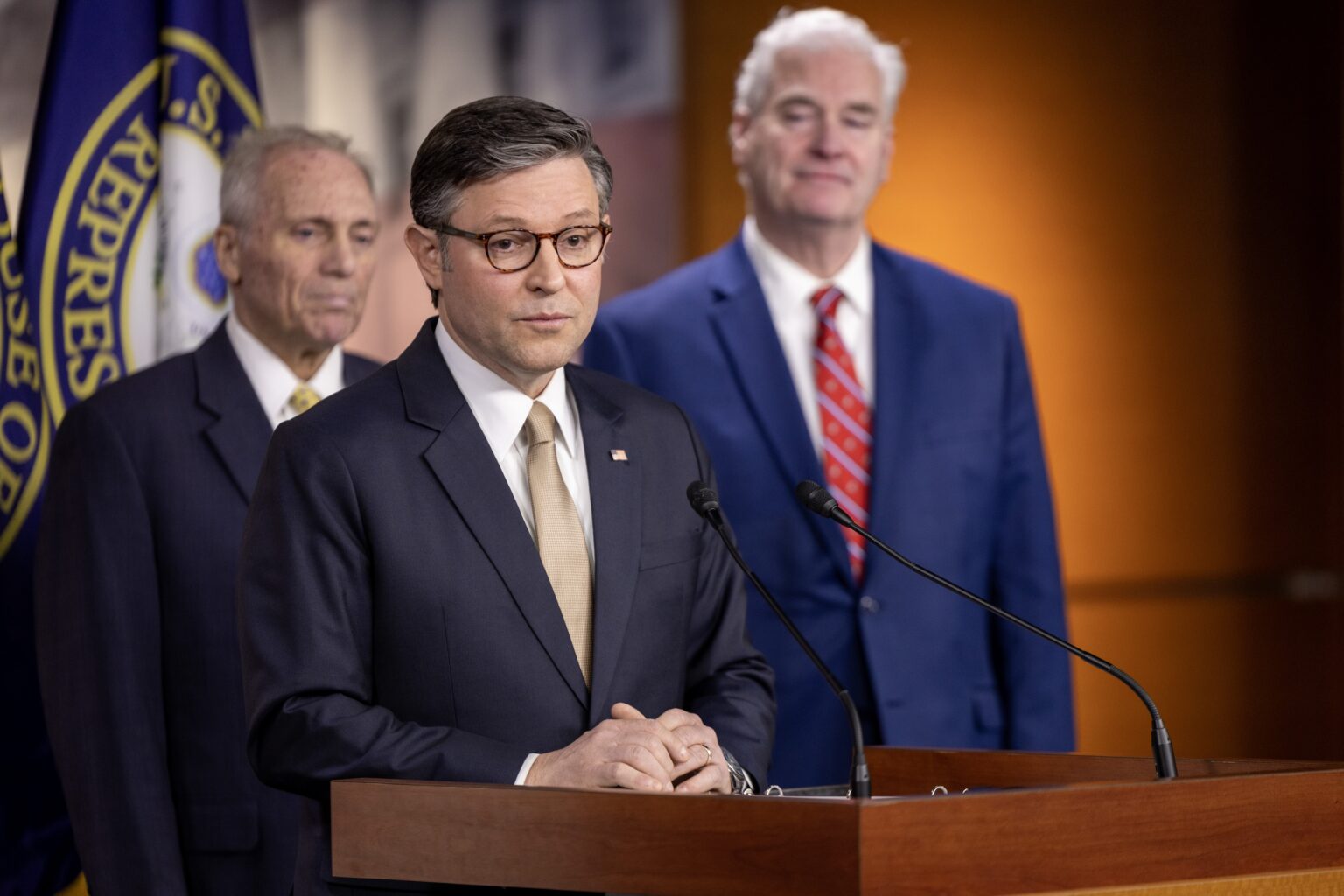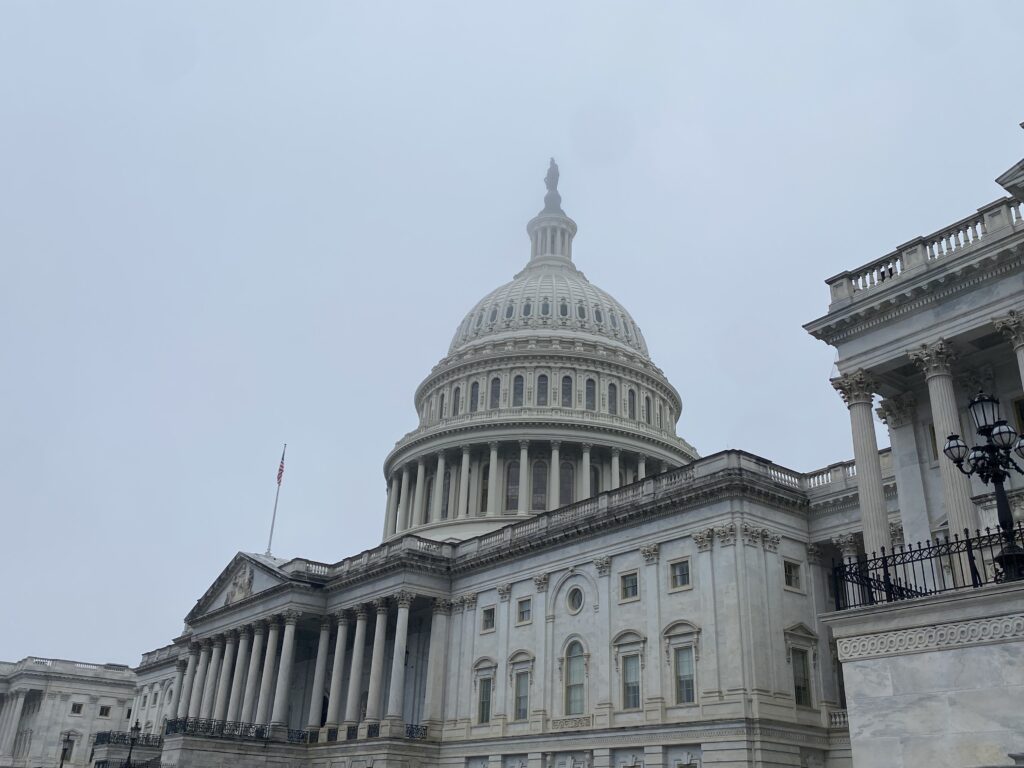WASHINGTON — U.S. House Speaker Mike Johnson stated on Tuesday that he will use the reconciliation process to handle the nation’s debt ceiling, excluding the prospect of reaching a bipartisan agreement with Democrats.
Because it enables lawmakers to circumvent the Senate’s 60-vote legislative filibuster, the GOP intends to use the convoluted budget reconciliation procedure to enact significant changes to taxation, immigration, and border security.
The goal is to deal with the debt ceiling during the process of reconciliation. According to Johnson, the Republican Party, which controls both houses, will then have the authority to decide on the specifics of that. Both parties will need to negotiate if it goes via regular order. And we believe that doing it ourselves is in our best interests.
In December, President-elect Donald Trump urged Republicans to either abolish the nation’s debt ceiling entirely or at the very least put it on hold for the remainder of his four-year administration.
In a short-term spending package that needed to be approved in December, House GOP leaders included a two-year suspension of the debt ceiling. However, they later withdrew the provision after failing to secure enough votes to approve the revised plan.
During a news conference on Tuesday in Mar-a-Lagoin, Florida, Trump stated that his main opinion regarding the debt ceiling is that he does not want a default.
Regarding the debt ceiling, I don’t want the cap; I just don’t want a default. Trump stated, “That’s all I want.” I never mentioned necessarily spending more money. Since no one can predict what would happen in the event of a default—it might be 1929 or nothing—all I want to see is no default.
Before the nation defaults, Congress should have several months to negotiate a new debt limit law. The previous debt limit suspension, which was negotiated between House Republicans and the Biden administration, ended on January 1.
The Treasury Department will continue to pay all of the country’s bills in full and on schedule during that time by employing accounting techniques known as extraordinary measures. The US would default, stop deficit spending, and probably plunge into a financial disaster if Congress did not approve a debt limit agreement by that so-called X-date.
Republicans will be compelled to complete the full package before the default date if the debt ceiling is added to reconciliation.
Usually, the Treasury Secretary notifies Congress on the likelihood of default on a regular basis, updating their estimates as the nation approaches the deadline. Before the end of January, the first of those letters might arrive.
Although Johnson acknowledged that there are differing opinions within the GOP on the debt ceiling, he stated during the news conference on Tuesday that he does not plan to allow a default to occur under unified Republican control of the country.
During split government, Republicans have historically used debt ceiling negotiations as leverage to gain ground on issues like government spending that they otherwise couldn’t have pushed to the forefront. However, when they have control of the House, Senate, and White House, they rarely do it.
“Our own conference has a wide range of opinions on that, and we are working through that,” Johnson stated. We’ll be doing long, purposeful whiteboard meetings with our members.
To ensure that everyone is in agreement on that, Johnson, R-La., stated that such discussions will occupy a significant portion of his and the House leadership team’s attention in the upcoming weeks.
Johnson also made an effort to distinguish between Republicans’ long-term spending cuts and attempts to reduce the size of the federal government and raising or suspending the debt ceiling.
I want to stress this, and I will say it each time the matter is brought up. According to Johnson, Republicans in this majority in the House and the Senate are working to restore fiscal sanity by reducing the size and reach of government and meaningfully cutting expenditure. In order to avoid creating the impression that we would be in some sort of default on the country’s debt, it is imperative that we raise the debt ceiling. The stability of the dollar, the bond markets, and everything else depend on that.
That does not, however, imply that we will allow spending up to the new debt ceiling or that we have any intention of doing so. The goal is to accomplish the exact opposite.
Johnson stated that while Republicans will consider many options to reduce government expenditure, he does not foresee cutting Social Security or Medicare payouts, which together account for almost one-third of all federal spending at $2.2 trillion annually.
According to Johnson, we must carefully examine every expenditure while upholding our promises. Don’t worry, the Republicans won’t reduce benefits. We repeatedly and unequivocally stated that. And the White House and this Republican Conference are committed to that.
However, he stated that in the next months, the GOP will examine federal agencies and departments very closely in an effort to discover ways to eradicate fraud, abuse, and waste.
As we proceed through the process, a very thorough auditing of all of that in different areas will be conducted, Johnson stated. At the same time, the project and the DOGE effort are underway, and we will be coordinating all of that.
Our goal is to demonstrate to the American people that we have reduced the government to a manageable level by the end of this Congress.
During his press conference in Mar-a-Lago, Trump stated that he would be fine with Republicans passing all of their policy objectives in a single reconciliation package, but that he would also be satisfied with two measures.
Trump declared, “I like one big, beautiful bill and I always have, I always will.” However, it does proceed a bit faster quickly if two is more certain because you may complete the immigration paperwork beforehand.
Republicans in the House and Senate have been debating whether to approve a single bill addressing immigration and border security first, then work on a second package that would cover tax policy, or to combine everything into a single reconciliation package.
During the Capitol Hill press conference, House Majority Leader Steve Scalise, R-La., stated that Republican leaders anticipate voting on the budget resolution that initiates the reconciliation process in February.
According to Scalise, the many committees that will be given reconciliation instructions once the House and Senate approve the budget resolution will start working on their own measures in March.
As long as Republicans can reach an agreement that garners support from both far-right and centrist party members, the entire House would then discuss and vote on the complete package in April before Easter, before sending it to the Senate.
“It’s an ambitious agenda, but we all signed up for it,” Scalise stated.
With only 219 members, the House GOP has a very slim majority, while Democrats have 215 seats. House GOP leaders need 218 votes to pass a bill to the Senate if every member is present and voting on it.
Since former Florida Representative Matt Gaetz chose not to take his oath of office, there is presently one vacancy; however, a special election will not be held until April 1. Since at least two more House Republicans are anticipated to leave for positions in the Trump administration, there will probably be more openings in the coming months.
With 53 Senate seats, Republicans can lose three votes on a reconciliation plan, but the process would be over if four or more senators opposed the bill.
The Senate Byrd Rule, which mandates that every provision in a reconciliation package have an effect on revenue or spending that is not merely incidental as judged by the Senate lawmaker, must also be followed by reconciliation packages.
This report was contributed to by Shauneen Miranda.
Note: Every piece of content is rigorously reviewed by our team of experienced writers and editors to ensure its accuracy. Our writers use credible sources and adhere to strict fact-checking protocols to verify all claims and data before publication. If an error is identified, we promptly correct it and strive for transparency in all updates, feel free to reach out to us via email. We appreciate your trust and support!



